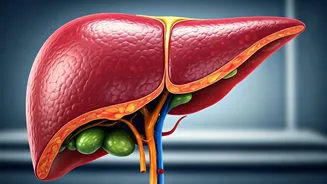The Silent Threat
Vitamin B12 deficiency is a significant health concern, yet it often slips under the radar. Its symptoms frequently mimic those of other ailments, leading
to misdiagnosis and delayed treatment. For instance, fatigue, forgetfulness, and mood swings, all possible indicators of a B12 shortage, can be easily confused with stress, ageing, or even depression. The deficiency can affect various bodily functions, from the creation of red blood cells to the protection of nerve cells and the production of DNA. A decline in B12 levels means the body can't transport oxygen effectively, leading to weakness and cognitive difficulties. This deficiency has a profound impact, yet its subtle nature often results in it being overlooked, emphasizing the need for greater awareness and proactive health management. Therefore, being informed is the first step towards better health.
Symptoms Unveiled
The symptoms of Vitamin B12 deficiency are vast and varied, often intensifying as the condition worsens. Persistent fatigue and weakness are amongst the most common early indicators, significantly impacting daily activities. Other signs include poor concentration, memory lapses, and mood swings, which can greatly impair cognitive functions and emotional stability. Experiencing irritability or feeling unusually low are further indications to consider. Additionally, physical symptoms such as numbness or tingling in the hands and feet, pale skin, or shortness of breath might arise. More severe and less common symptoms can involve frequent infections and slow-healing wounds, along with brittle nails or hair loss. Because of how it may be initially overlooked, it is crucial to recognize these warning signs and seek medical advice promptly. Doing so can facilitate early diagnosis and intervention, potentially preventing more severe health problems.
Why Indians At Risk?
Specific dietary habits and lifestyle factors make Indians particularly susceptible to B12 deficiency. A significant factor is the prevalence of vegetarianism and veganism in the population, as B12 is primarily sourced from animal products. Since the body doesn't produce it naturally, the restriction in animal-based food intake can lead to insufficient B12 levels. A study revealed that almost half the Indian population tested showed inadequate Vitamin B12 levels, especially in urban adults with little dairy or animal protein in their diets. Furthermore, certain medications, like those used to treat diabetes (metformin) and acid reflux, can hinder B12 absorption. Ageing also contributes to the risk, as the body's ability to produce stomach acid, vital for releasing B12 from food, declines over time. These combined factors increase the likelihood of deficiency, highlighting the importance of understanding individual risk factors and making dietary or lifestyle changes as needed.
Boosting B12 Intake
Addressing Vitamin B12 deficiency involves a combination of dietary adjustments and, sometimes, supplementation. Those with mild deficiencies can often improve their levels by increasing their consumption of B12-rich foods. These include eggs, milk, fish, and meat. For vegetarians and vegans, incorporating fortified foods, such as certain cereals and plant-based milk alternatives, can be a great option. In some cases, supplements may be required to quickly raise B12 levels. These come in various forms, including oral tablets, sublingual tablets, and injections. The best option depends on the severity of the deficiency and individual needs, so consulting a healthcare professional is crucial to determine the most effective approach. Furthermore, regular monitoring of B12 levels through blood tests is essential to ensure that the chosen strategies are working and that levels stay within a healthy range.
Taking Action Now
Taking proactive steps to address and prevent Vitamin B12 deficiency is crucial for overall health and well-being. Start by paying attention to your body and noting any of the warning signs discussed, such as fatigue, cognitive issues, or mood changes. If you experience these symptoms, consulting a healthcare provider for a thorough check-up is recommended. They can perform a blood test to determine your B12 levels and discuss an action plan. Also, evaluate your diet and lifestyle. Ensure a balanced intake of B12-rich foods or consider fortified alternatives if you follow a vegetarian or vegan diet. If supplementation is needed, work closely with a doctor to determine the appropriate dosage and administration method. By taking these proactive measures, you can protect your energy, enhance your cognitive function, and contribute to your overall health, paving the way for a more vibrant life.





















